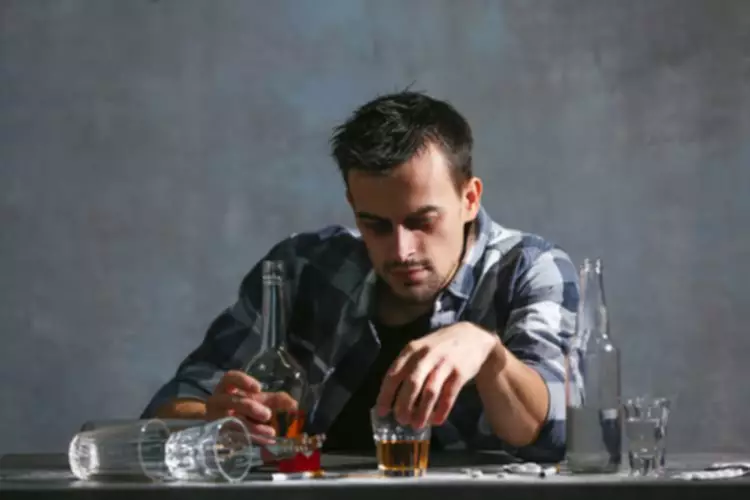
Using Model 1 of the PROCESS SPSS macro (Hayes, 2012), we tested whether alcohol use to down-regulate despondency, anger, and positive emotions, separately and simultaneously, indirectly affected the relationship between PTSD symptom severity and alcohol misuse. Gender responses were coded into ‘male’ and ‘female’ (other responses were excluded due to limited endorsement) and included as a covariate in study analyses given well-established relations with both PTSD (Kilpatrick et al., 2013) and AUD (Grant et al., 2015). The bootstrap method was used for estimating the standard errors of parameter estimates and the bias-corrected confidence intervals of the indirect effects (MacKinnon et al., 2002; Preacher & Hayes, 2004). The bias-corrected confidence interval is based on a non-parametric re-sampling procedure that has been recommended when estimating confidence intervals of the indirect effect due to the correction it applies over a large number of bootstrapped samples (Efron, 1987). The indirect effect is significant if the 95% confidence interval does not contain zero (Preacher & Hayes, 2004).
- Participants are encouraged to obtain a sponsor who will serve as a source of practical advice and support during recovery.
- In summary, Petrakis and colleagues conclude that clinicians can be reassured that medications that are approved to treat AUD can be used safety and with some efficacy in patients with PTSD, and vice versa.
- These include a history of childhood trauma, exposure to combat or other forms of violence, genetic predisposition to addiction, and pre-existing mental health conditions.
- Anger that is everlasting and does not diminish over time is dangerous to a survivor’s overall mental health.
Posttraumatic Stress Disorder and Co-Occurring Substance Use Disorders: Advances in Assessment and Treatment
Most people with PTSD have an urge to avoid any memories or flashbacks of the trauma. In other words, you may begin using alcohol as a way to cope with PTSD symptoms, but it becomes a dangerous learned behavior. Military veterans represent another important population for PTSD and drinking.

Support, Transition, Action, Resolve, Transformation
In addition to their standard residential SUD treatment, these individuals received 9 bi-weekly sessions of prolonged exposure, as well as in vivo and imaginal homework assignments between sessions. Post-treatment evaluations indicated that none of the individuals met criteria for PTSD, and this finding was maintained at 3 and 6-month follow-up. In addition, incorporation of prolonged exposure did not lead to increased rates of treatment dropout or relapse. Although preliminary, the findings support the feasibility of integrating prolonged exposure into residential SUD treatment facilities (see Henslee & Coffey, 2010). Over time Ryan came to better understand factors that why do some people get angry when they drink contributed to his drinking, including his anger and increased aggression when drinking.
- Individuals with greater PTSD symptom severity reported significantly higher alcohol use to down-regulate despondency, anger, and positive emotions, which, in turn, were linked to greater alcohol misuse.
- Now, individuals with comorbid AUD and PTSD, as well as their health care providers, have additional treatment options available.
- There were no statistically significant differences in age, years of education, and CES-K at the time of CAPS implementation.
- These strategies may include identifying triggers, developing coping plans for high-risk situations, and regularly attending therapy or support group meetings.
Psychedelic-Assisted Therapy
Such increases in endorphin activity are observed in response to trauma and may also occur during exposure to trauma reminders. Afterward, a period of endorphin withdrawal may explain the physiological hyperactivity, depression, and irritability that mark patients with PTSD. This model has two important implications for the treatment of PTSD and alcoholism. First, therapy aimed at increasing one’s sense of mastery over traumatic events can help patients cope when exposed to trauma reminders. By reversing feelings of helplessness, one can alcoholism treatment more easily recover from PTSD and related alcohol problems. Second, the use of opioid blockers such as naltrexone may block the effects of alcohol and break the addictive cycle.

As described above, animals that experience uncontrollable trauma learn that their responses are of no consequence, leaving them helpless to cope with a traumatic situation. Given the high rates of dropout reported across studies and treatment types, research is needed to enhance retention among individuals with AUD/PTSD. Relatedly, the definition of a treatment “completer” needs to be better standardized, as it is difficult to interpret and compare treatment outcomes across studies when the results are based on patients who received widely different amounts of the prescribed treatment. It is recommended that all trials report on participants who complete the entire treatment protocol. This has an effect on the life of the person exhibiting this consistent https://ecosoberhouse.com/ anger.
- The interventions target relationship skills and skills related to reducing AUD severity.
- Studies that compare other outcomes related to treatment retention and symptom improvement, such as sleep, mood symptoms, somatic medical conditions, and safety profiles (including violence and suicidality), would also be helpful.
- He has served as a clinical director, clinician, and supervisor for mental health pro- grams in acute, sub-acute, and outpatient facilities, and in primary care.
- These include psychological and developmental issues that are affected by trauma, as well as neurobiological effects of early trauma that can lead to increased vulnerability to the development of alcohol and other substance use disorders.
- When they aren’t under the influence, you can try speaking openly with them about how their actions make you feel, how they’re affecting your family and why something needs to change.
